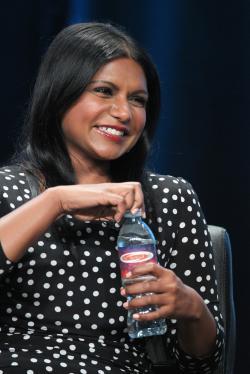GQ may be a men’s magazine. But this week, Mike Flaherty’s so-called “Men’s Guide to Fall TV” is a disservice to men, and a fantastic illustration of why networks, when they go after male audiences, treat guys like they’re dumb.
“All they have to do is look over at the cable nets to see that if they build quality shows—intellectually challenging; the violence is bloody with no skimping of carnage; adults speak like fucking adults; people are actually naked when they have sex—we will come,” he insists. And yet while Flaherty demands that the broadcast networks treat his readers like real men, he mostly speaks to them like they’re the sum of their penises.
“Laura Benanti (who plays the therapy group’s leader) provides some excellent eye candy,” he says of NBC’s therapy sitcom Go On. His only reason to watch CBS’s Sherlock Holmes drama Elementary? “There’s [Lucy] Liu, you know, if you’re into Asian chicks.” Ditto for The Mindy Project: “Not much to see here—unless, you know, you’ve got a thing for smart-assed Indian chicks.” If you watch Partners, about a gay man and a straight man who are best friends and business partners, “You get to ogle the straight guy’s fiancée, played by the delicious Sophia Bush (One Tree Hill). I know, I know…I said bush. Heh.”
When Flaherty isn’t treating his readers like dumb sex maniacs, he isn’t exactly raising the bar higher. He recommends tuning into the ABC sitcom The Neighbors, about a family who moves into a suburb populated by aliens, because “It’s ridiculously broad, inane, and its male lead is uber-schlub Lenny Venito (The Sopranos). In other words: Worth a look!” And he even complains that Arrow, the CW’s surprisingly effective superhero drama, isn’t manly enough because the titular hero shoots people rather than vaporizing them.
I’m the last person to argue that this crop of fall television shows is particularly guy-centric or dude-positive. But there’s a real petulance and short-sightedness to Flaherty’s complaint that “the broadcast networks really dislike the scrotally endowed.” Some of the biggest hits on television are about men, including CBS’s The Big Bang Theory and How I Met Your Mother. If you can get past the fact that the main characters aren’t men, something that seems to be a real stumbling block for Flaherty, the count of fantastic manly men on television gets even higher, with more coming this fall. Parks and Recreation may focus on newly-minted Pawnee Councilwoman Leslie Knope, but is there a deeper or more positive endorsement of traditional masculinity anywhere on television than Ron Swanson, with his Pyramid of Greatness? Nashville, the upcoming ABC drama Flaherty doesn’t even deign to address, may have a rivalry between female country singers at its heart, but it’s got fantastic Deadwood alum Powers Boothe as a scheming land tycoon and the setup for a knockdown, drag-out mayoral race between two men who represent competing visions of the new South.
It’s telling that it isn’t enough for Flaherty that the rise of cable has been overwhelmingly, thunderingly dominated by men and male characters. From Tony Soprano, to Stringer Bell, to Al Swearengen, to Raylan Givens, to Jax Teller, to Tyrion Lannister, to Dexter Morgan, to Louis C.K., to Walter White, the scales are completely weighted toward men on cable. Those of us ladies watching at home are supposed to be satisfied with the wives and girlfriends, second-tier characters all, and a few ensemble shows like Game of Thrones as our share of the pie. Yes, we’ve got Homeland, but the Carrie Mathisons of the world are only now beginning to make up for more than a decade of extreme imbalance.
Is this really not enough for GQ? Is it really necessary to complain about the fact that networks have decided to devote some of their programming to courting female viewers, who watch more television than men in every age group? Is it really smart to tell your readers that, in order for television to get better for men, the women who appear on it have to get hotter, dumber, and more naked?
If Flaherty and other guys watching television want to have a serious conversation about how to improve the depictions of men on television, I’m ready for it. Watching clueless dolts is as boring and depressing for me as it is for you, gentlemen. But the place to start that conversation is not with a complaint that men, who have been the beneficiaries of the best of the best on television for more than 10 years, and who, according to the Women’s Media Center’s 2012 Report on the Status of Women in the US Media, represented 59 percent of all television characters in the 2010-11 television season, are uniquely oppressed.
